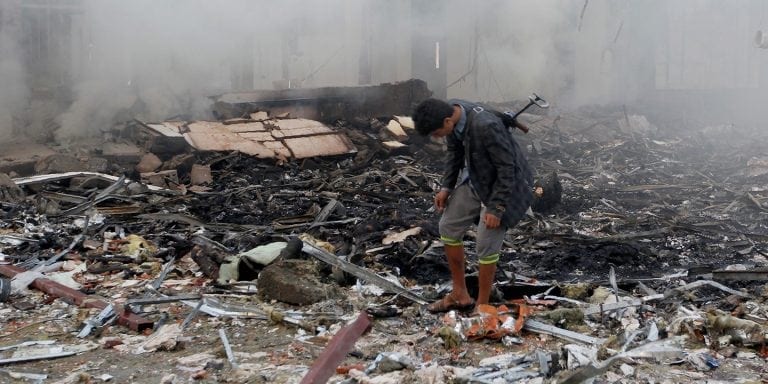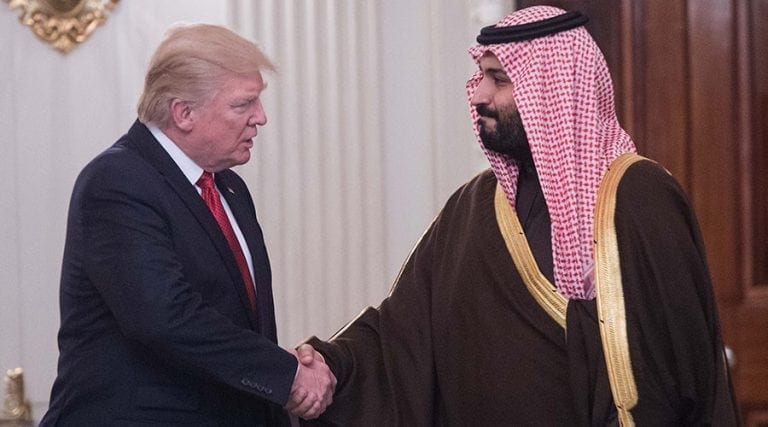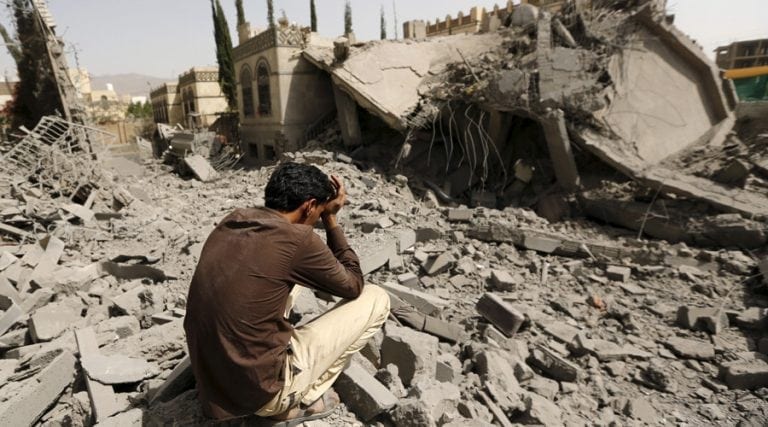“The situation in Yemen – today, right now, to the population of the country,” UN humanitarian chief Mark Lowcock told Al Jazeera last month, “looks like the apocalypse.”
150,000 people are thought to have starved to death in Yemen last year, with one child dying of starvation or preventable diseases every ten minutes, and another falling into extreme malnutrition every two minutes. The country is undergoing the world’s biggest cholera epidemic since records began with over one million now having contracted the disease, and new a diptheria epidemic “is going to spread like wildfire” according to Lowcock. “Unless the situation changes,” he concluded, “we’re going to have the world’s worst humanitarian disaster for 50 years”.
The cause is well known: the Saudi-led coalition’s bombardment and blockade of the country, with the full support of the US and UK, has destroyed over 50% of the country’s healthcare infrastructure, targeted water desalination plants, decimated transport routes and choked off essential imports, whilst the government all this is supposed to reinstall has blocked salaries of public sector workersacross the majority of the country, leaving rubbish to go uncollected and sewage facilities to fall apart, and creating a public health crisis. A further eight million were cut off from clean water when the Saudi-led coalition blocked all fuel imports last November, forcing pumping stations to close. Oxfam’s country director in Yemen, Shane Stevenson, commented at the time that “The people of Yemen are already being starved to submission – unless the blockade is lifted quickly they will have their clean water taken away too. Taking clean water from millions of people in a country that is already suffering the world’s largest cholera outbreak and on the verge of famine would be an act of utmost barbarity.”
Since then, things have been getting worse. As of late January, fuel imports through the country’s main port Hodeidah were still being blocked, with cholera cases continuing to climb as a result. And on 23rd January, the UN reported that there are now 22.2 million Yemenis in need of humanitarian assistance – 3.4 million more than the previous year – with eight million on the brink of famine, an increase of one million since 2017.
This is unsurprising, as both the bombardment and the blockade have intensified in recent months. For almost a month at the end of last year, the coalition blocked all imports into Hodeidah port, through which 70% of the country’s imports would otherwise enter. And since the death of former President Ali Abdullah Saleh on 4th December, the air campaign has been stepped up, with massacres occurring on a near-daily basis. On 9th February, the UN announced that 85,000 had been displaced in ten weeks due to “surging violence”, particularly on the Red Sea Coast, where the coalition have mounted a new campaign to capture the country’s strategically important Hodeidah port.
With the Hodeidah campaign now entering a new phase, this war on the Yemeni population is set to escalate still further. Since it launched in early December, the coalition and their Yemeni assets have taken several towns and villages on Hodeidah province, and are now poised to take the battle to the city itself. On 20th February, Emirati newspaper The National reported that, in the coming days, “more forces will be committed to Hodeidah as a new front is to be opened in the next few days by Maj Gen Tariq Mohammed Abdullah,” nephew of the deceased former president Ali Abdullah Saleh. This attack would put the almost completely-import dependent country’s most essential port out of action for months, leaving millions unable to survive. “If this attack goes ahead”, Oxfam chief executive Mark Goldring told the press when a similar attack was proposed earlier last year, “this will be a deliberate act that will disrupt vital supplies – the Saudi-led coalition will not only breach International Humanitarian Law, they will be complicit in near certain famine.” His colleague Suze Vanmeegan added that “any attack on Hodeidah has the potential to blast an already alarming crisis into a complete horror show – and I’m not using hyperbole.”

The killing of children by the Saudis, directly by bombs and indirectly by hunger and disease—with irrefutable support from the Americans and the British, and who knows who else in the NATO/Zionist coalition—is a prosecutable crime under international statutes promulgated by the UN. Yet the very UN has named Saudi Arabia as chair of the Human Rights Council. It doesn’t get more Orwellian than that.

There is no doubt the war’s British and American overseers have given their blessing to this escalation. In late 2016, the “Yemen Quartet” was formed by the US, the UK, Saudi Arabia and the UAE to co-ordinate strategy between the the war’s four main aggressors. Throughout 2017, they met sporadically, but since the end of the year their meetings have become more frequent and higher-level. At the end of November, just before the launch of operations in Hodeidah province, Boris Johnson hosted a meeting of the Quartet in London as Theresa May simultaneously met with King Salman in Riyadh, presumably to give the go-ahead to this new round of devastation for Yemen’s beleaguered population. They met again two weeks later, and then too on 23rd January, also at Johnson’s instigation, where the meeting was attended, for the first time, by Rex Tillerson. The “economic quartet” – also attended by officials from the IMF and World Bank – convened on 2nd February in Saudi Arabia, whilst Johnson and Tillerson once again met with their Saudi and Emirati counterparts to discuss Yemen in Bonn on 15th February. Of course, these meetings do not carry out the nitty-gritty of strategic war planning – civil servants in the military and intelligence services do that. The purpose of such high level forums is rather for each side to demonstrate to the others that any strategic developments carry the blessing of each respective government at the highest level. That the “quartet” met just days before an announcement that the long-planned attack on Hodeidah port was imminent, then, speaks volumes about US-UK complicity in this coming new premeditated war crime.
These military and humanitarian ‘developments’ (if such a word can be applied to the deliberate reversal of a country’s living standards) form the backdrop to the Saudi-led coalition’s unveiling on 22nd January of their new plan to deliver “unprecedented relief to the people of Yemen”. YCHO – “Yemen Comprehensive Humanitarian Operations” – is a new ‘aid’ programme with the ostensible aim of “addressing immediate aid shortfalls while simultaneously building capacity for long-term improvement of humanitarian aid and commercial goods imports to Yemen”, primarily through increasing the “capacities of Yemeni ports to receive humanitarian as well as commercial imports” – and all sealed with a whopping $1.5billion in aid contributions. What could possibly be wrong with that?
The problem here is not only that the the funding required to meet the needs created by the Saudi-led coalition is estimated by the UN to be twice that amount. The real problem is that the plan will not, in fact, increase the imports on which Yemen is utterly dependent, but reduce them still further. This is because the much-vaunted ‘improvements in port capacity’ will apply solely to “coalition-controlled ports”, excluding the ports outside their control – Hodeidah and Saleef – which, between them, handle about 80% of Yemen’s imports. For these, absolutely critical, ports, the plan explicitly states that it wants a reduction in the flow of cargo they handle: by around 200 metric tons per month, compared to mid-2017 levels. Yes, you heard correctly: cargo levels in mid-2017 – when 130 children were dying each dayfrom malnutrition and other preventable diseases largely caused by the limits on imports already in place – are now deemed in need of further, major, reductions. This plan is nothing less than a systematisation of the starvation politics of which the Saudis were accused by the UN Panel of Experts on Yemen in relation to their closure of Hodeidah and Saleef in November. Back then, noted the panel’s Final Report, all Yemen’s ports had been closed following a Houthi missile attack on Riyadh airport. But whilst coalition-controlled ports were quickly reopened, Hodeidah and Saleef remained closed for weeks. “This had the effect,” said the panel, “of using the threat of starvation as an instrument of war.” Today, the ‘Comprehensive Operations’ plan envisages making permanent the juxtaposition of wilful starvation of Houthi-controlled territory (in which the vast majority of Yemenis live) and ‘generous’ aid deliveries into coalition-controlled territories. These are the same ‘methods of barbarism’ as were employed by the British in the Boer war – when Boer-controlled territories were subjected to scorched earth policies of torching farms and destroying livestock – and then revived for Britain’s colonial wars in Malaya, Kenya and, indeed, Yemen in the 1950s-60s. Small wonder Britain is so deeply involved today.
But such a strategy will surely be hard to sell in this day and age. Certainly, the Saudis seem to think so; which is presumably why they have employed a plethora of the world’s most notorious PR agencies to help them do so.
An exceptional investigation by the IRIN news agency reported that “the press release journalists received announcing the [YCHO] plan came neither from the coalition itself nor from Saudi aid officials. It came, along with an invitation to visit Yemen, straight from a British PR agency”. That agency was Pagefield Global Counsel, one of the successor companies to disgraced PR giant Bell Pottinger (employing over 20 former Pottinger staff).
The investigation also revealed that the powerpoint presentation used to introduce the YCHO to high level UN officials was authored by Nicholas Nahas, of Booz Allen Hamilton, a US management consultancy with long-established links to the US state – including involvement in the illegal SWIFT and PRISM mass surveillance programmes – and which currently has, says IRIN “35 job listings in Riyadh on its website, including “military planner”, a role that requires the applicant to: “Provide military and planning advice and expertise to support the coordination of Joint counter threat operations executed by coalition member nations and facilitate resourcing to enable operations.””
Another PR company involved in ‘selling’ the YCHO, long on the Saudi payroll, is Qorvis MSLGROUP, who, says IRIN, “booked US revenue of more than $6 million from the Saudi Arabian embassy [in the US] over a 12-month period up to September 2017”.
These masters of spin have certainly been busy: their work on the plan has been delivered to “the offices of major INGOs in the UK as well as to members of the UK parliament”, and YCHO accounts has been set up on facebook, twitter, instagram, youtube and gmail. The YCHO twitter account has around 10,000 followers; but, says the investigation, “almost half of YCHO’s followers have less than 10 followers themselves, while some 1,000 followers were accounts created on the same day in 2016 – signs that a significant number of bots or fakes are inflating YCHO’s popularity”.
“All of this,” concludes IRIN, “has fed suspicions that rather than a genuine attempt to help the people of Yemen, the plan is really intended more to gloss over the Hodeidah issue and improve Saudi Arabia’s battered image, or at least a bit of both.”
You would think a strategy aimed at starving the world’s most starving population still further would be a hard sell. But, then, money not only talks, it silences. And $1.5 billion is a lot of money.
The UN’s own ‘Humanitarian Response Plan’ for Yemen, issued just two days before the YCHO, on 20th January, had noted that “Al Hudaydah port, which accounts for 70-80 per cent of commercial imports in Yemen, remains a critical lifeline, despite operating at reduced capacity after being hit by an airstrike in August 2015”, adding that “the extended blockade imposed on Al Hudaydah and Salif ports on 6 November 2017 significantly threatened this lifeline of Yemenis” and that “only a sustained flow of imports of essential basic goods can avert further catastrophe”. Yet the cash-strapped UN, facing dramatic budget cuts from the Trump administration, and presumably nervous of saying anything that might jeopardise Saudi-Emirati money as well, officially welcomed the announcement, despite its clear commitment to essentially tightening the very blockade of Hodeidah and Saleef ports which the UN had denounced just days earlier.
Thankfully, the aid agencies do not seem to have been fooled. A joint statement on the YCHO by a number of international NGOs, including Oxfam and Save the Children, stated that “We remain concerned that the blockade on Red Sea ports has still not been fully lifted and about the insufficient volume of fuel reaching these, which has led to an increase in the price of basic goods across the country. As a result, we are seeing families pushed into preventable disease and starvation because they cannot afford to buy food and clean water. Hodeidah port handles the majority of the country’s imports and cannot be substituted. It is vital that the warring parties commit to keep Hodeidah port fully open and functioning, including unfettered access for both humanitarian and commercial supplies.” Save the Children’s Caroline Anning explained that the plan “is a misconception – in the publicity around this new plan they say the blockade around Hodeida port has been fully lifted but actually what we’re seeing is that fuel is still being blocked coming into that port which is having a really horrendous knock-on effect around the country.” She added that if “they want to try and push the delivery of key important commercial supplies through other ports like Aden, Jazan and Saudi Arabia and cut off the Hodeida port, again that could be really problematic and again it means one of the warring parties in the conflict is controlling access routes for goods coming in…Improved humanitarian access is really important and that’s been a massive challenge – but in reality that’s not going to solve the humanitarian conflict in Yemen. We’ve seen increased violence, air strikes across the country in the last few months, civilians being killed every day, vital infrastructure like health clinics being hit all the time. While that’s happening and while the economy is collapsing and public sector salaries aren’t being paid, the humanitarian crisis is going to continue.”
And the International Rescue Committee (IRC)’s scathing response – issued with the title “Yemen: Saudi ‘aid’ plan is war tactic” – is worth quoting at length:
“The Yemen Comprehensive Humanitarian Operations (YCHO), announced on January 22, 2018, is neither comprehensive, nor reflective of clear, shared humanitarian priorities…The YCHO politicizes aid by attempting to consolidate control over access and transit points. Rather than endorsing a parallel plan, which was created without broad input from humanitarian actors, the Saudi Led Coalition (SLC) and its supporters, notably the US and UK, should work to ensure the full implementation of the existing UN humanitarian response plan.
“The name in itself is misleading: it is neither comprehensive, nor particularly humanitarian,” said Amanda Catanzano, senior policy and advocacy director at the International Rescue Committee. “The Saudi-led coalition is offering to fund a response to address the impact of a crisis it helped to create. The acute crisis in Yemen needs more than what appears to be a logistical operations plan, with token gestures of humanitarian aid”. The IRC go on to list a number of ‘red flags’ about the plan, first and foremost, that it does not end the blockade: “If the Saudis were serious about addressing the humanitarian crisis,” they point out, “the most valuable step they could take would be to lift the blockade, permanently, which they and the international community should do without delay”. Furthermore, they add, the YCHO “severely threatens humanitarian access, endangering the lives of millions more civilians. The plan would move the main hub of the response from Hodeidah port to Aden port and would increase capacity of additional Southern ports of Mokha and Mukalla as additional alternatives. The development of additional Yemeni ports is welcome and laudable, but not at the expense of access to Red Sea ports like Hodeidah and Saleef. The southern ports are neither equipped for, nor well placed to service populations in need: they the lack basic infrastructure and capacity of the northern ports, through which 80% of all imports come into Yemen, and humanitarians would need to go through 70 checkpoints between Sanaa and Aden, complicating delivery and driving up costs”. They also note that it is precisely the Saudi-led coalition and its Yemeni stooges who have implemented a policy of cutting off payments to public sector workers, leading to the current public health disaster: “The acute deprivation in Yemen is as much a function of the blockade as it is the absence of basic public services. The SLC is overfunding the war effort at the expense of governance and service delivery. The vague “economic stabilization” clause in the YCHO does not address the restoration of basic public services. These funds should be used to reinstate basic government services and pay government workers.” It concludes:
“A meaningful response to the world’s largest humanitarian crisis requires more access – not less. At best, this plan would shrink access and introduce new inefficiencies that would slow the response and keep aid from the neediest Yemenis, including the over 8 million on the brink of starvation,” said Catanzano. “At worst, it would dangerously politicize humanitarian aid by placing far too much control over the response in the hands of an active party to the conflict.”
Essentially, this is a plan to tighten the blockade whilst monopolising access to aid in the hands of the aggressors, presented as a great humanitarian effort, and unveiled just as the coalition begins an attack on the country’s “vital lifeline” which will lead to “a complete horror show” and “near-certain famine”. In the twisted minds of men like Mohammed bin Salman, Rex Tillerson and Boris Johnson – for whom even the liquidation of an entire people is a apparently a noble cause in the pursuit of containing Iran – this is what passes for humanitarianism today.
A shorter version of this article originally appeared in Middle East Eye







 STEPHEN LENDMAN was born in 1934 in Boston, MA. In 1956, he received a BA from Harvard University. Two years of US Army service followed, then an MBA from the Wharton School at the University of Pennsylvania in 1960. After working seven years as a marketing research analyst, he joined the Lendman Group family business in 1967. He remained there until retiring at year end 1999. Writing on major world and national issues began in summer 2005. In early 2007, radio hosting followed. Lendman now hosts the Progressive Radio News Hour on the Progressive Radio Network three times weekly. Distinguished guests are featured. Listen live or archived. Major world and national issues are discussed. Lendman is a 2008 Project Censored winner and 2011 Mexican Journalists Club international journalism award recipient. His new site is at
STEPHEN LENDMAN was born in 1934 in Boston, MA. In 1956, he received a BA from Harvard University. Two years of US Army service followed, then an MBA from the Wharton School at the University of Pennsylvania in 1960. After working seven years as a marketing research analyst, he joined the Lendman Group family business in 1967. He remained there until retiring at year end 1999. Writing on major world and national issues began in summer 2005. In early 2007, radio hosting followed. Lendman now hosts the Progressive Radio News Hour on the Progressive Radio Network three times weekly. Distinguished guests are featured. Listen live or archived. Major world and national issues are discussed. Lendman is a 2008 Project Censored winner and 2011 Mexican Journalists Club international journalism award recipient. His new site is at 














